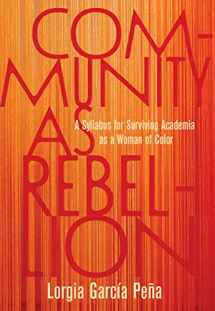
Community as Rebellion: A Syllabus for Surviving Academia as a Woman of Color
Book details
Summary
Description
A meditation on freedom making in the academy for women scholars of color.
Weaving personal narrative with political analysis, Community as Rebellion offers a meditation on creating liberatory spaces for students and faculty of color within academia. Much like other women scholars of color, Lorgia García Peña has struggled against the colonizing, racializing, classist, and unequal structures that perpetuate systemic violence within universities. Through personal experiences and analytical reflections, the author invites readers—in particular Black, Indigenous, Latinx, and Asian women—to engage in liberatory practices of boycott, abolition, and radical community-building to combat the academic world’s tokenizing and exploitative structures.
García Peña argues that the classroom is key to freedom-making in the university, urging teachers to consider activism and social justice as central to what she calls “teaching in freedom”: a progressive form of collective learning that prioritizes the subjugated knowledge, silenced histories, and epistemologies from the Global South and Indigenous, Black, and brown communities. By teaching in and for freedom, we not only acknowledge the harm that the university has inflicted on our persons and our ways of knowing since its inception, but also create alternative ways to be, create, live, and succeed through our work.


We would LOVE it if you could help us and other readers by reviewing the book
Book review



